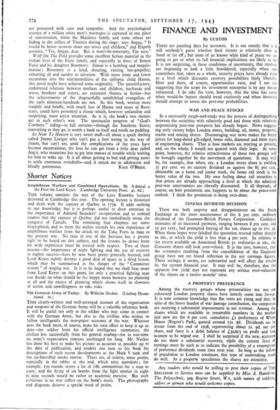Amphibious Warfare and Combined Operations. By A dmiral o
Shorter Notices
the Fleet the Lord Keyes. (Cambridge University Press. 4s. 6d.) Tuts volume , contains the text of the Lees Knowles lectures delivered at Cambridge this year. The opening lecture is historical and deals with the capture of Quebec in 5759. It adds nothing to our knowledge, but it is perhaps useful to draw attention to the importance of Admiral Saunders' co-operation and to remind readers that the capture of Quebec did not immediately mean the conquest of Canada. The remaining four chapters are auto- biographical, and in them the author records his own experience of amphibious warfare from the attack on the Taku Forts in 19oo to the present war. No man in any of the Services has a greater right to be heard on this subject, and the lessons he draws from his wide experience must be treated with respect. Two of these lessons—the' importance of night fighting and the use of reserves to exploit success—have by now been pretty generally learned, and Lord Keyes rightly devotes a good deal of space to a third lesson, which may be summarised as the danger of the " Committee system " of waging war. It- is to be hoped that we shall hear more from Lord Keyes on this point, for only a practical fighting man can decide on what should be the happy mean between no planning at all and the excess of planning which shows itself in slowness of action and unwillingness to take risks.


























 Previous page
Previous page